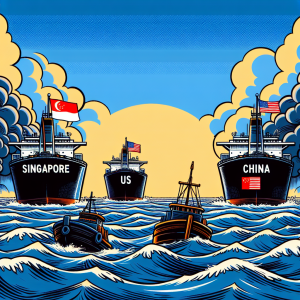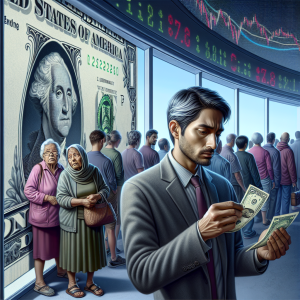Peter Navarro, a prominent advisor to former President Donald Trump, has recently stirred the financial waters by promoting stock investments just a day after downplaying a significant market plunge driven by tariffs. This juxtaposition has raised eyebrows among investors and analysts alike, particularly given Navarro’s controversial history in U.S. economic policy.
In a recent interview, Navarro referred to the market’s reaction to tariff announcements as "no big deal," suggesting that the volatility was overblown. However, the following day, he urged investors to consider buying into stocks, claiming that the long-term economic fundamentals remain strong. This sudden pivot has left many questioning the coherence of his economic philosophy, especially as Navarro has long been a proponent of protectionist trade policies that many economists deem problematic.
The Navarro Legacy
Navarro’s influence on U.S. economic policy during the Trump administration was significant, particularly regarding trade relations with China. He was a staunch advocate for tariffs, arguing that they were essential to protect American manufacturing and address unfair trade practices. His views often clashed with mainstream economic thought, as he believed that high tariffs would help reduce trade deficits and bolster domestic industries. Critics, however, have labeled his approach as fringe, suggesting that it could lead to unintended consequences such as increased consumer prices and strained international relations.
Despite his controversial stance, Navarro’s consistent messaging has resonated with a segment of the political landscape that prioritizes American economic sovereignty. His recent comments highlight a persistent tension between short-term market reactions and long-term economic strategies, a theme that has become increasingly relevant in today’s volatile financial environment.
Market Reactions
Investors have responded with mixed feelings to Navarro’s latest pronouncements. While some view his advice as a potential buying opportunity, others remain skeptical, recalling the tumultuous effects of his trade policies during the Trump administration. The stock market has shown resilience in recent months, but Navarro’s ability to sway investor sentiment remains to be seen.
As the global economy continues to navigate challenges such as inflation and supply chain disruptions, Navarro’s influence may become more pronounced. His advocacy for protectionism and skepticism of free trade agreements could shape discussions on economic strategy, particularly as the U.S. seeks to redefine its relationship with China in the wake of ongoing geopolitical tensions.
In conclusion, Peter Navarro’s recent stock market hype, juxtaposed with his nonchalant dismissal of tariff-induced market fluctuations, underscores the complexities of economic policymaking in a rapidly changing world. As investors weigh the implications of his advice, the broader conversation about trade, tariffs, and economic strategy is likely to intensify, reflecting the ongoing debates that have characterized Navarro’s career.





